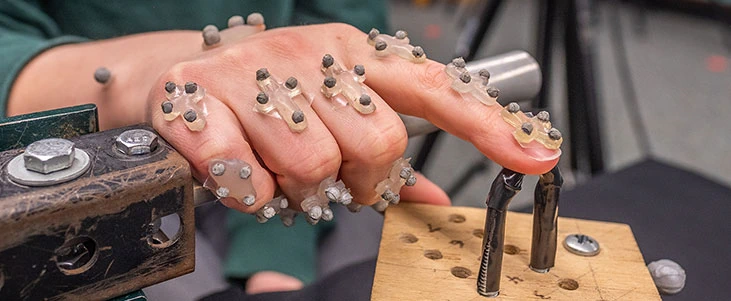
Welcome to Biomedical Engineering
Biomedical engineering is the application of engineering principles and design concepts to advance healthcare practices, including medical diagnosis, treatment, and monitoring. This highly multidisciplinary field cuts across traditional disciplinary boundaries of engineering, biology, and medicine, and emphasizes the importance of translational engineering research that makes findings from basic science useful for practical applications that improve human health.
The Department of Biomedical Engineering (BME) at Michigan State University consists of core faculty and adjunct faculty with interdisciplinary interests ranging from bioinformatics to nano-robotics to neural engineering to molecular imaging. The department is growing rapidly and is located in a new 130,000 square-foot facility outfitted with state-of-the-art research tools and infrastructure. Our department is closely aligned with MSU’s new Institute for Quantitative Health Science & Engineering. Research and training opportunities are available through multiple new initiatives including investment in novel imaging systems, new partnerships with healthcare organizations McLaren Health and Henry Ford Health, and the MSU Facility for Rare Isotope Beams (FRIB), allowing for exploration of rare isotopes in medical diagnostics and treatment.
35
Graduate Students
(Fall 2024)
10
Degrees Granted
(2023-2024)
$4.5M
Research Expenditure
(Fall 2024)
18
Tenure Faculty
(Fall 2023)
 Welcome to the Biomedical Engineering Department (BME) at Michigan State University! Biomedical Engineering at Michigan State University engages faculty across disciplines, departments, and colleges to explore the intersection of medicine, human biology with engineering research, design, and practice. Through collaboration and interdisciplinary research, we aim to develop new methods for understanding, diagnosing, and treating medical conditions, and translating discoveries from the laboratory to the classroom and the clinic.
Welcome to the Biomedical Engineering Department (BME) at Michigan State University! Biomedical Engineering at Michigan State University engages faculty across disciplines, departments, and colleges to explore the intersection of medicine, human biology with engineering research, design, and practice. Through collaboration and interdisciplinary research, we aim to develop new methods for understanding, diagnosing, and treating medical conditions, and translating discoveries from the laboratory to the classroom and the clinic.
Michigan State University is a leader in interdisciplinary biomedical research, and the resources of the BME Department are enhanced by collaborations throughout the College of Engineering and with many other MSU Colleges, including Human Medicine; Osteopathic Medicine; Veterinary Medicine; Nursing; Natural Science; and Communications Arts and Sciences. The BME Department is housed in MSU's new Institute for Quantitative Health Science & Engineering, an interdisciplinary research center devoted to basic and applied research at the interface of life sciences, engineering, information science, and other physical and mathematic sciences.
Cheri Deng
Chairperson
Biomedical engineering is the application of engineering principles and design concepts to advance healthcare practices, including medical diagnosis, treatment, and monitoring. This highly multidisciplinary field cuts across traditional disciplinary boundaries of engineering, biology, and medicine, and emphasizes the importance of translational engineering research that makes findings from basic science useful for practical applications that improve human health.
The BME Department at Michigan State University (MSU) offers PhD and Master's graduate programs. A wide range of course offerings and research activities allows an individual program to be designed to fit the background, capabilities, and goals of the student. See the Department of Biomedical Engineering's Graduate Academic Program section to learn more about our graduate program and degree requirements. For application requirements, please see our doctoral program admission detail. Additional information for current and future graduate students is available in the Graduate Studies page of this website.
The Department of Biomedical Engineering is located in the Institute for Quantitative Health Science & Engineering (IQ), which is dedicated to basic and applied research at the intersection of engineering, human medicine, and natural science.